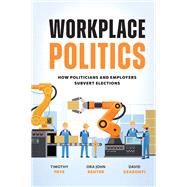Workplace Politics How Politicians and Employers Subvert Elections
, by Frye, Timothy; Reuter, Ora John; Szakonyi, David- ISBN: 9780197802014 | 019780201X
- Cover: Paperback
- Copyright: 7/30/2025
In many countries politicians rely on employers to influence the voting behavior of their employees, but this type of voter mobilization has received very little attention. Workplace Politics draws on unique surveys of firm managers and employees in eight countries, as well as a wealth of fine-grained observational data and qualitative interviews from Russia, to demonstrate that workplace mobilization is common, often coercive, and unpopular with many voters. It argues that when firm managers depend on the state, cannot easily move their assets, or can easily replace workers, politicians can induce employers to get their workers to the polls.
In these settings, politicians and employers can use workplace mobilization to diminish voter autonomy, undermine electoral integrity, and skew electoral outcomes in favor of entrenched political groups. But because workplace mobilization is unpopular in the broader electorate, politicians use this strategy less frequently in information-rich settings, where voters are likely to learn about it. This book helps explain why countries whose economies are dominated by state interventions in markets, immobile capital, and slack labor markets may be especially prone to clientelism and autocratic rule and contributes to core debates in comparative politics and political economy.
In these settings, politicians and employers can use workplace mobilization to diminish voter autonomy, undermine electoral integrity, and skew electoral outcomes in favor of entrenched political groups. But because workplace mobilization is unpopular in the broader electorate, politicians use this strategy less frequently in information-rich settings, where voters are likely to learn about it. This book helps explain why countries whose economies are dominated by state interventions in markets, immobile capital, and slack labor markets may be especially prone to clientelism and autocratic rule and contributes to core debates in comparative politics and political economy.






